|
Children naturally and unashamedly want what they want. And they usually want it when they want it! Most of us got the message along the way, wanting is not good. We should be satisfied with what we have. We shouldn't be selfish. Good girls and boys don't ask for things. As adults, we have difficulty tapping back into that wanting. So many conflicting messages. As adults, we know, a rubber toy isn't going to do it. Material things might give us a fleeting moment. We can milk experiences a bit more because they give us memories. But as adults, we want more intangible things.
We want to feel free of pain, physical and emotional. We want to feel close to our partner. We want to time travel backwards and change that last bad decision we made. We want to be free from those panic attacks. Yes, we still want things. I wish i could drive to Mobile and get these things for these lovely souls I work with. They all deserve it, they've been so good. Wanting it all, Allison PS-Sign up for my email list and I’ll share some great relationship tips with you! https://www.winningyourrelationshipgame.com/sign-up-for-4-awesome-videos.html
Comments
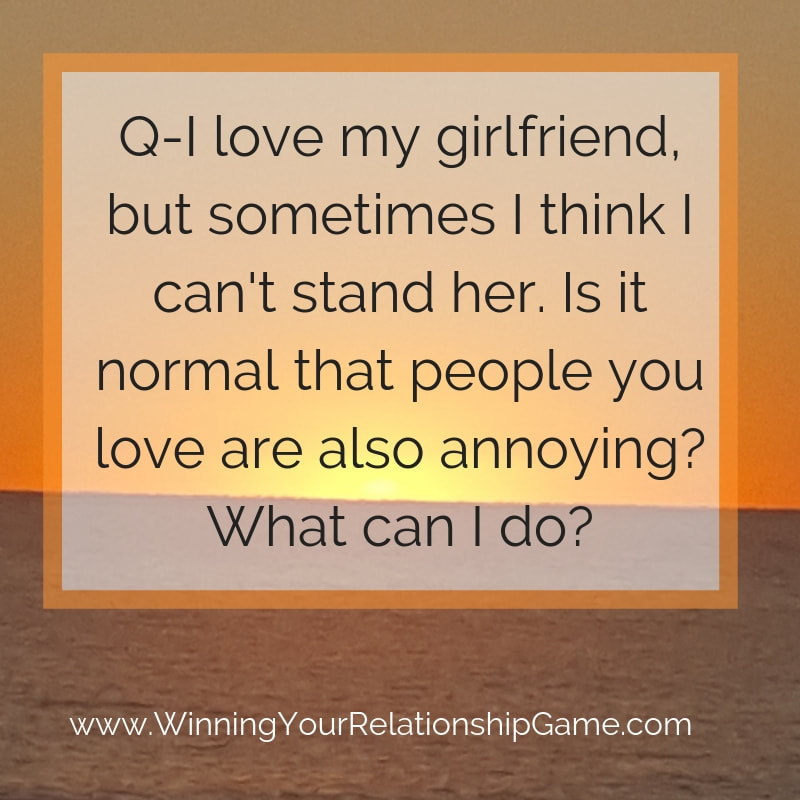 A-God, I hope so! Have your parents ever annoyed you? Have you ever annoyed them? Yet you most probably love each other.
Loving someone doesn't mean you never feel other emotions towards them. In fact, loving someone often makes those emotions much more intense. Try a few things. Focus on yourself. How can you be more happy and fulfilled within yourself? Do that. Focus on the things you love and appreciate about your girlfriend. You can never count on another person changing, so see the positives much larger than the negatives. Evaluate whether you're spending too much time together. We all need a balance of together, others and personal time. Sometimes a relationship can feel exciting and obsessive at first, you set up these patterns of spending all your time together and it isn't sustainable. Think of the adage, Man cannot live by bread alone. Too much of only one thing, or person, isn't good for us. Embrace the paradox, Be separately together! Allison We celebrated together which doesn’t always happen. If you don’t know, my husband works away and sometimes we miss spending important days together.
We talked a bit about the choices we’ve made in our shared past and how it’s impacted us. We discussed some future plans too. We talked about how every decision has a cost and you have to decide if you’re willing to pay it. One of the decisions for us has been the lifestyle we’ve chosen. There’s been a big cost to us like not spending certain times together, not sharing in certain things, but the benefit has been a great payoff too. We’ve been able to travel with our children. For the past 10 years, we’ve travelled somewhere new every year. It’s made us more diverse as people, a couple and a family. We feel it’s been worth the cost. Many families spend the day to day with each other, never connecting, never really enjoying each other, taking each other for granted. I joke with my husband that we have 3 honeymoons a year. No doubt things would be very different if we’d made different choices along the way. Would they have been better? Maybe they would have been worse. I believe it taught us an appreciation of our time together. Maybe we’d have found our way to that without being apart. There’s no way to know. Now we anticipate seeing each other, and we’re sad to part, but we immediately start to plan and look forward to the next time we’re together. It hasn’t always been that way. There’s many times we’ve felt isolated and taken for granted, so it’s a constant readjustment, renegotiation, and reassurance situation. So my question for you: How connected are you and your partner right now? Are you in a cycle of non appreciation for each other? Do you look forward to spending time together? Can you talk to your partner about how you’re feeling? If not, can you move in that direction? Practice Time: If you feel disconnected from your partner, think back to the last time you felt connected. What were the BEHAVIORS that YOU were doing at that time? Were you listening attentively to your partner? Were you smiling at them? Were you holding hands and going somewhere fun together? Recreate the scenario as closely as you can. You might not feel like it, but you don’t have to. Just DO it. Even from a distance, Allison PS-Join me in my self coaching program if you want a little extra. 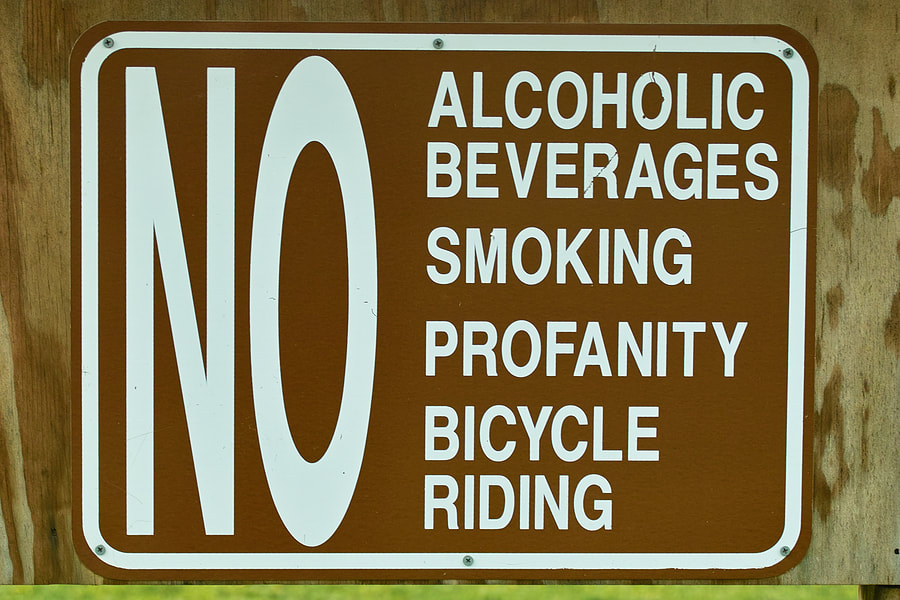 People who start to use alcohol or other substances don’t start out with the plan of becoming addicted. Most people feel that they can handle their level of planned use. Many times, maintaining this level of use is possible. About 10% of all people who use will become addicted. No one can tell why or when this will occur. Addiction is considered using a disease model most of the time. Once someone crosses the line to addiction, this is a point of no return. Usually treatment is the most useful course of action at this time. As reviewed in the first part of this article, substance use generally starts as experimentation due to curiosity and usually in a social situation. Tobacco and alcohol are considered “gateway drugs” and if use continues, is usually followed by marijuana use. When substance use first starts, it may be inconsistent, based on social situations usually. If drug use continues, usually with other inhaled or ingested drugs, but can run the spectrum to intravenous drug use among other methods. The physiological effects of substances are based in the body chemistry. Substances will act on receptors in the brain which control basic functions of the body. These substances create a pleasurable feeling or even a euphoria. This results in an attraction to use of the substance again in search of that same satisfying feeling. This attraction and euphoria pattern repeats itself again and again as the cycle of addiction proceeds. The next stage of the addiction process is problematic use. This stage is characterized by increased amount and frequency of use. Intoxication is actively sought. The waves of euphoria are followed by intensifying periods of discomfort. During this stage of the addiction process, the individual may begin to experience problems which are related to use. Problems may be in work, school, family, or financial areas of one’s life. If the consequences of use are not enough to interrupt the cycle of use, it may continue to the dependency stage. When someone has a physical or psychological dependence, they will experience distress when they are unable to use or attempt to discontinue use. Symptoms of dependence include compulsive use, impaired control over the amount or frequency of use, a preoccupation with the rituals of use and/or continued use in spite of adverse consequences. Early addiction stages may be referenced as a period of “romance” with the substance. Like a special romantic interest, the person may find themselves daydreaming of upcoming planned use of the substance. Physical dependence usually results as this stage progresses. At this point, euphoria is no longer experienced and use is required for the person to feel normal. Repercussions of use will continue in the social areas of the user’s life. Within the addictions process, individuals may move from problematic use to abstinence and back over time. Once someone has reached the dependence stage, it is commonly believed that they can never be cured and must maintain abstinence or return to problematic use. Most professionals feel that once the dependence state is reached, the person will not be able to return to unproblematic use. While many theories of the etiology of addiction exist, we do not know why or how people will become addicted. Most likely, there are multiple factors that contribute to this outcome. These factors include psychological stressors, environmental status, or physiological states. Again, if you or someone you love is struggling with problematic substance use, reach out for help. Find a local resource or check the SAMHSA website at: https://www.samhsa.gov/find-treatment Allison
here are several criteria to successful behavior changes. First, there has to be a desire to change. Second, there has to be a substitute for the problem activity. Third, a system of accountability ensures lasting change. While it is fairly easy to find an accountability system, it’s even easier to find a substitute activity. The really difficult part of this equation is to develop the desire to change.
How can you develop the desire for change to occur? There are two types of motivation. One is a “towards” motivation. Examples of a toward goal is regaining health or reconnecting in lost relationships. The second type of motivation is “away from” motivation. Examples of away from goals are losing employment or losing my residence. The best type of goal builds in both towards and away from motivators. Another method of building motivation is to increase the discomfort with the present situation. This is often what occurs when an Intervention occurs. Loved ones raise the awareness of the negative aspects of the situation and outline clearly what the boundaries are for the future. Often this involves a withdrawal of support or a suspension of relationship which creates a new level of discomfort and urgency for change to occur. While I am speaking to work with addictions, these techniques can be very useful for any type of behavioral change. If you have struggled with a particular behavior, identify the towards and away from motivations. You can create a motivator to “turn up the volume” in one direction or another. You can do this with yourself, but embedding a system of accountability into it is helpful. For instance, a friend and I are training to run a 5k race. We agreed that every day we are supposed to train and we don’t, we will pay the other person $1. I don’t want to pay her $1, but I really don’t want to have to tell her I didn’t follow through. You can see that even if we aren’t very good at our routine, we won’t likely go broke! You can be sure though, that we eagerly report to each other when we do our workout (and even when we don’t). There is a towards motivation: being prepared to run a 5k. There is an away from motivation: paying the $1. There is a system of accountability: we report our success to each other. The replacement activity in this case is the running which takes the place of other activities in our lives such as watching TV or sleeping in. What ideas can you come up with for establishing your own behavior change? Constantly changing, Allison Sign up for my email list and I’ll share some great relationship tips with you! https://www.winningyourrelationshipgame.com/sign-up-for-4-awesome-videos.html Concerned about porn use by you or your partner? This video discusses why porn might be detrimental to your relationship. Sign up for my email list and I’ll share some great relationship tips with you!
https://www.winningyourrelationshipgame.com/sign-up-for-4-awesome-videos.html Emotions are always trying to tell us something. Is there a source of unhappiness in your relationship? Boredom? Believe me, every relationship has issues. I bet you felt the same excitement about your current boyfriend when you first met.
Unfortunately, when we feel attracted to another person, we begin to compare them to our partner. Of course, we know all our partners warts, so we are comparing apples and oranges. Consider it fully before you end a real relationship for something you don't really know. If the relationship is important to you, consider counseling. It may help you recognize whether you really want to be committed or not. Hope that helps, Allison PS- Sign up for my email list and I’ll share some great relationship tips with you! https://www.winningyourrelationshipgame.com/sign-up-for-4-awesome-videos.html  When working to make change, it can be helpful to explore the intention in as many different sensory capacities as possible. Writing is one of those activities that requires thought process and then physical action tied to that process. This makes writing an effective method of expanding and reinforcing learning. Writing is a reminder of the goal. Often there is a situation which has created a significant amount of pain for you. For instance, perhaps you have been arrested for driving under the influence. This is usually a source of pain and shame. As time heals all wounds, over time, the memory of this pain dulls. Therefore, there is value in recording this pain. At some point in the future, you’ll start to feel that “it wasn’t that bad”. The written account will serve as a reminder. This can apply for many types of behavior we want to change. Writing can clarify the goal. At times, our thoughts can be “foggy”. Writing and review can help us become more focused on specific goals regarding that change. Written thoughts can give you clues on where to focus attention. I like to use a game of “whys”. So, an example might be: Why do you overeat? Because I’m bored. Why are you bored? Because I have nothing to do. Why do you have nothing to do? Because I can’t afford to do anything. Why can’t you afford to do anything? Because I’m disabled. This example leads to multiple potential interventions that can be addressed. A person may be disabled, but they can find inexpensive or free things to do. Or perhaps they need to deal with the grief surrounding being disabled and the limitations that brings. Writing can provide insight. Insight means gaining an accurate and deep intuitive understanding of self. Often, writing illuminates things about our ourselves that we hadn’t realized. When you commit to journaling even briefly every day, it can lead to insight that has not been realized until this time. This can cultivate further focus for growth or even for more writing. Often, people have had an unsuccessful attempt in the past to journal consistently and this creates a resistance. If this is you, try a prompt that only requires one or two words. People can usually make the commitment to do this as a minimum. My own journaling practice focuses on 5 areas of my life: Relationships, Health, Career, Abundance, and Gratitudes. I do a quick summary of each of these, a few sentences. If things are great, GREAT! If things are a bit “jangly”, I go into how I might improve that area. Since personal writing is a direct reflection of yourself, you’re bound to learn something. Give it a try and let me know how it goes! And remember, you are lovely! Allison 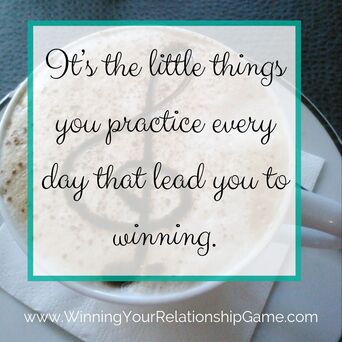 Outcomes are goals that we strive for. As a culture, we are pretty addicted to meeting goals. We’re taught how to set goals that are SMART. (Specific, Measurable, Attainable, Realistic and Time Limited). Which is great if you actually could set a goal like that! Believe me, when I worked with an agency, there was like 1 person out a 100 who could actually set a goal that the auditors thought was SMART. In your relationship, what’s your goal? Is it to fight less? Not fight at all? Is it to be “in love” again? A lot of times, I have people say, “I want us to get back to where we used to be.” Those are all pretty big goals. What happens when a goal seems out of reach? When we look at it and it seems impossible. Fighting less might seem like a great goal, but what are the steps it takes to get there? Do you know the steps? If you knew and could do the steps, wouldn’t you have already done them? When we start doing these little steps, we get frustrated because we feel we should be at the goal already. We feel shame and blame we’re not meeting what we see as our desired outcome. We also fail sometimes. I can’t tell you how many couples are making good progress and they slip and have a huge row and they feel like they’ve lost all the progress they’ve made. All that can make us give up and stop going for it. It seems like an exercise in futility, it’s too difficult, or we just aren’t capable of doing it. Well, I’d like to reassure you. When the end game seems impossible, it’s time to focus on the process, not the outcome. Using a football analogy here: If your desired outcome is to win the Super Bowl, but your team has not learned to run a play yet, you better focus on running the play! Not only do you need to learn to run the play but you need to become great at it! You are going to run that play over and over until it’s second nature. You’re going to know that play inside and out. At first, the play is going to be awkward. At first, the whole team isn’t going to be good at it. There’s going to be a lot of failures in making the play. But eventually, your team runs a great play! They win a game, then another and before you know it you’re a Super Bowl contender. That outcome that seemed so impossible is now within reach. But only after you’ve mastered the process. There have been times in my relationship when I’ve felt happiness wasn’t possible. I didn’t think it’d ever happen again. That seemed like an outcome that was too much to hope for. Turning that around took a focus on the process. The processes of a happy relationship, (I call the pillars) are compassion, communication and commitment. Making the little decisions every day that align with these qualities is what got me closer to the end goal. I had to be kind when I didn’t want to be. I had to decide to stay just one more day when it would have felt great to walk out. Talking about things that made me vulnerable created intimacy little by little. I focused on the process because I didn’t know how to get to the outcome I wanted. I was so far away from it, I needed a telescope. By paying attention to the process, I moved closer and closer, with consistency and persistence, until I could see happiness on the horizon. I tried to stay focused on my own behaviors, not my partners. By continuing on, we’ve found our way to a place of happiness I don’t think we ever imagined. We’ve now passed our 20th anniversary and we enjoy each other more now than we ever did. Do we still disagree? Yes. Do we still annoy each other? Yes. We fail all the time. But we focus on the process. Practice time: What is your desired outcome? What processes do you need to get there? It’s the little things you practice every day that lead you to winning. What is one process you can commit to today? Consistency and persistence are mandatory! Let me know what you decided. Comment below, I’d love to hear from you! Cheers to the process! Allison PS-Did you know I have a Self Coaching Program? It's available here. Now, recall the last time you got angry at your partner about something. Was it over the dirty laundry left in the bathroom floor? Now, in the grand scheme of things, that dirty laundry really isn’t’ that big a deal is it? Get curious about what’s really going on. What’s really got you going is the meaning you’ve placed on that situation. So does dirty laundry on the floor even though you’ve asked a million times mean that you’re not being heard? Does it mean that your partner doesn’t care about what’s important to you? Does it mean you feel disrespected? Apply some curiosity and you’ll find a deeper meaning.
Pretty soon you’ll understand why you’re so riled up. The dirty clothes serve as evidence for something that’s meaningful to you. The ability to communicate in deeper terms allows you to more truly express yourself to your partner and it allows them to know you more and more. Our intimacy grows when we can share our inner selves more with our partners. Maybe even more important is recognizing that the same way you get wrapped up in something insignificant, applying deeper meaning to it, is your ability to recognize the same thing happens to your partner! This is where curiosity helps again. When your partner is angry at you, can you get curious about the deeper meaning? What’s on the surface is only minimally related to the deeper attachment need, our need to belong. If you can tease out the deeper meaning for your partner, you can help to soothe the part of them that’s feeling a bit shaky. What a wonderful thing to be able to do for each other. Practice time: OK, cast your mind back to the last time you got irritated or flat out mad with your partner. What was the surface issue? Did it really mean that much? Or was there a more significant, deeper, truer meaning? What was it? Can you initiate a conversation with your partner and let them know what was actually happening for you? This isn’t to resolve it, it’s just to let your partner know you better. If you want bonus points, think about the last time your partner got angry with you. Look beyond the surface issue and get curious about the deeper meaning. Can you initiate a conversation about that with your partner? You might just end up knowing them better too! Curiosity might have killed the cat, but it saves relationships! Stay Curious Lovelies, Allison I want you on my email list! I'll send you 4 videos with some great, practical relationship tips and share so much more! SIGN UP HERE |
Helping You
|





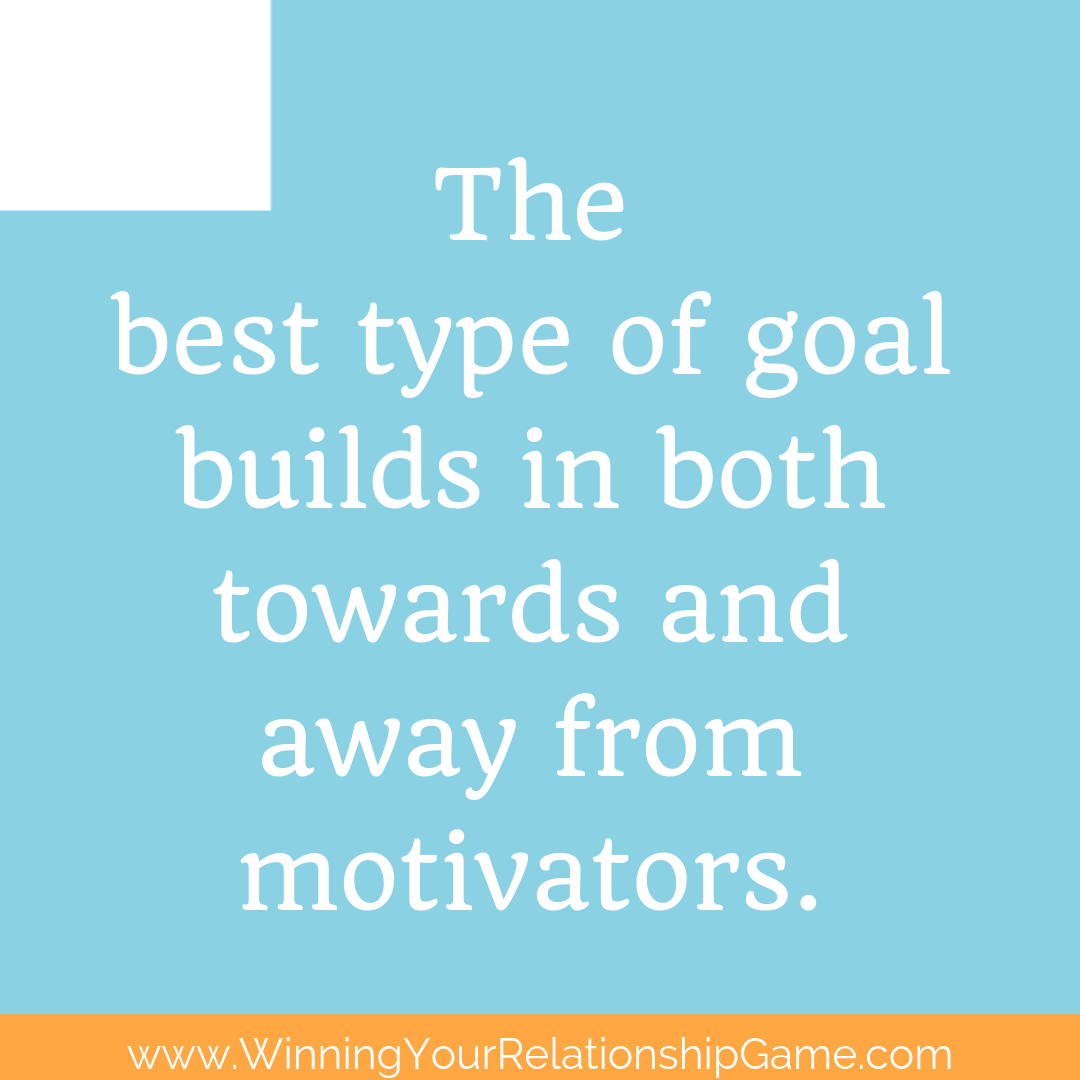


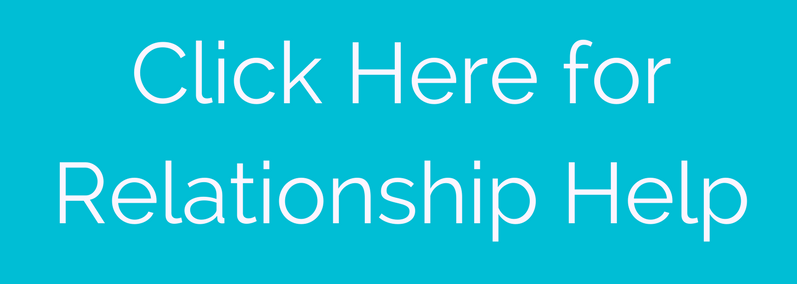

 RSS Feed
RSS Feed

